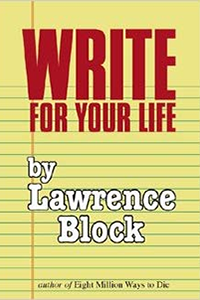 I’ve blogged about Lawrence Block and his book Write for Your Life before. I have immense respect for him, both as a person and as a writer, and I’ve continued to do the exercises he presents in Write for Your Life.
I’ve blogged about Lawrence Block and his book Write for Your Life before. I have immense respect for him, both as a person and as a writer, and I’ve continued to do the exercises he presents in Write for Your Life.
Most of the exercises are one-and-done. I’ve completed those and found them valuable. But I am still at work on a cycle of affirmations designed especially for writers.
As a writer himself, Block has been observing writers and the writing life for decades. He’s seen writers with only moderate talent build successful writing careers, while more brilliant writers fail to do so. And vice versa, of course. But talent does not seem to correlate with success.
He’s seen writers who work only moderately hard find success, while some writers who work ridiculously hard fail. And vice versa. But beyond a certain threshold, hard work doesn’t seem to correlate with success either.
What does correlate with success? Block says that what a writer believes in her heart of hearts about herself is the key. And one way to change that belief—if it is negative—is to work with affirmations.
Several of the exercises in Write for Your Life are designed to help you unearth the central negative belief you hold about yourself, so that you can challenge it and change it. But Block has observed that most writers also hold other beliefs in common.
So he created a constellation of 30 affirmations to challenge those beliefs. Try it for a month, he recommends, focusing on a different affirmation each day.
That’s what I’m in the middle of doing.
Block says that for writers, writing is particularly effective, so the exercise is to write each affirmation 20 times.
Here is today’s affirmation:
I CAN ALWAYS AFFORD TO TAKE CHANCES. It’s safe for you to risk rejection. Taking chances makes you certain of success. The more you take chances, the more you know you’re safe.
Now, I have not been using Block’s affirmations verbatim. I adjust them as needed to speak to my inmost heart. This one became:
And my thoughts about it are a little different as well.
It’s by taking artistic chances that I will be most authentic. And it is my authenticity that appeals to readers. By appealing to readers, my readership will grow.
I’ve made one other change. Block suggests that one simply write out the affirmation 20 times. I find it hard to keep my mind focused for that many identical repetitions, so I write the first 5 in first person, the second 5 in second person, the third 5 in third person, and the last 5 in first person again.
Block himself suggests this format for another exercise in Write for Your Life. I thought that was very clever, so I borrowed it for this exercise.
I can always afford to take artistic chances.
I can always afford to take artistic chances.
I can always afford to take artistic chances.
I can always afford to take artistic chances.
I can always afford to take artistic chances.
Jessica, you can always afford to take artistic chances.
Jessica, you can always afford to take artistic chances.
Jessica, you can always afford to take artistic chances.
Jessica, you can always afford to take artistic chances.
Jessica, you can always afford to take artistic chances.
Jessica can always afford to take artistic chances.
Jessica can always afford to take artistic chances.
Jessica can always afford to take artistic chances.
Jessica can always afford to take artistic chances.
Jessica can always afford to take artistic chances.
I can always afford to take artistic chances.
I can always afford to take artistic chances.
I can always afford to take artistic chances.
I can always afford to take artistic chances.
I can always afford to take artistic chances.
Care to join me? 😀 C’mon! Let’s try it together!
I can always afford to take artistic chances.
I can always afford to take artistic chances.
I can always afford to take artistic chances.
I can always afford to take artistic chances.
I can always afford to take artistic chances.
Fill in your name now!
____________, you can always afford to take artistic chances.
____________, you can always afford to take artistic chances.
____________, you can always afford to take artistic chances.
____________, you can always afford to take artistic chances.
____________, you can always afford to take artistic chances.
____________ can always afford to take artistic chances.
____________ can always afford to take artistic chances.
____________ can always afford to take artistic chances.
____________ can always afford to take artistic chances.
____________ can always afford to take artistic chances.
I can always afford to take artistic chances.
I can always afford to take artistic chances.
I can always afford to take artistic chances.
I can always afford to take artistic chances.
I can always afford to take artistic chances.
How do you feel?
Lighter? More positive? With more energy? Stronger?
I do, but this is an affirmation that dovetails with my inner beliefs. I already believe that taking artistic chances is the best way to go. So repeating this affirmation brings my own optimism to the fore, and I feel good.
At least two of Block’s cycle of 30 affirmations drew up my pessimism instead. On them, I chose to use yet another tool that Block presented: writing out the inner protest called up by the affirmation.
The idea is that writing that protest gets it out of your subconscious and into the light of your conscious self, where you can challenge it. I think it works like the broken-record technique one sometimes uses when trying to sort out a conflict with a loved one.
Instead of escalating the conflict by making an extreme response to an extreme provocation, one simply repeats oneself.
Like this:
The more I’m seen and noticed, the more life nourishes me.
Not sure that’s right.
The more I’m seen and noticed, the more life nourishes me.
Is it safe?
The more I’m seen and noticed, the more life nourishes me.
Won’t someone hurt me?
The more I’m seen and noticed, the more life nourishes me.
I want to be nourished.
The more I’m seen and noticed, the more life nourishes me.
I wish.
Jessica, the more you’re seen and noticed, the more life nourishes you.
I doubt it.
Jessica, the more you’re seen and noticed, the more life nourishes you.
Why then have I been so impoverished?
Jessica, the more you’re seen and noticed, the more life nourishes you.
I’ve been nourished emotionally and spiritually,
but I’d like to see some financial nourishment!
Jessica, the more you’re seen and noticed, the more life nourishes you.
B.S.
Jessica, the more you’re seen and noticed, the more life nourishes you.
Feh!
The more Jessica is seen and noticed, the more life nourishes her.
Yeah, well, she could use some nourishing now.
The more Jessica is seen and noticed, the more life nourishes her.
I was struck today by how God has cared for us over the last year.
The more Jessica is seen and noticed, the more life nourishes her.
I feel trust right this moment.
The more Jessica is seen and noticed, the more life nourishes her.
But I’m still scared of other people.
The more Jessica is seen and noticed, the more life nourishes her.
Yet people can be God’s hands in the world.
This affirmation-and-response pattern closes with just a repetition of the affirmation.
The more I’m seen and noticed, the more life nourishes me.
The more I’m seen and noticed, the more life nourishes me.
The more I’m seen and noticed, the more life nourishes me.
The more I’m seen and noticed, the more life nourishes me.
The more I’m seen and noticed, the more life nourishes me.
If you found yourself fighting today’s affirmation—I can always afford to take artistic chances—try it again with a response. The response can be anything. Blurt out the first thing you think of, and carry on.
I can always afford to take artistic chances
__________________________________
I can always afford to take artistic chances
__________________________________
I can always afford to take artistic chances
__________________________________
I can always afford to take artistic chances
__________________________________
I can always afford to take artistic chances
__________________________________
____________, you can always afford to take artistic chances.
__________________________________________________
____________, you can always afford to take artistic chances.
__________________________________________________
____________, you can always afford to take artistic chances.
__________________________________________________
____________, you can always afford to take artistic chances.
__________________________________________________
____________, you can always afford to take artistic chances.
__________________________________________________
____________ can always afford to take artistic chances.
______________________________________________
____________ can always afford to take artistic chances.
______________________________________________
____________ can always afford to take artistic chances.
______________________________________________
____________ can always afford to take artistic chances.
______________________________________________
I can always afford to take artistic chances.
I can always afford to take artistic chances.
I can always afford to take artistic chances.
I can always afford to take artistic chances.
I can always afford to take artistic chances.
Better?
I hope so. But if not, maybe this affirmation challenges one of your core beliefs. In which case, you might try working with it for several days. You might be amazed at the freedom you gain.
May you be happy. May you be well. May you be peaceful. May you be free.
😀
For more about Lawrence Block and Write for Your Life, see:
Lawrence Block and Unforgettable Characters—Take 1
Lawrence Block and Unforgettable Characters—Take 2






